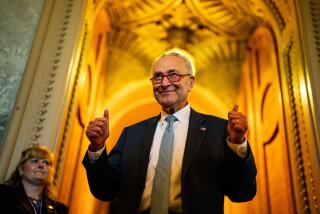Medicare Panel Fails to Adopt Rescue Plan
- Share via
WASHINGTON — A sharply divided federal commission on Medicare failed Tuesday to agree on a long-range rescue plan, setting the stage for a bitter political debate over how to pay for health care when the baby-boomer generation becomes eligible for benefits.
The vote was 10 to 7, falling short of the 11 votes needed to make an official recommendation to Congress by the Bipartisan Commission on the Future of Medicare.
Hours before the commission’s climactic vote, President Clinton attacked the majority proposal as insufficient to assure Medicare’s future solvency. “Every independent expert agrees that Medicare cannot provide for the baby boom generation without substantial new revenues,” Clinton told reporters on the White House lawn, and he promised to offer a plan of his own.
Firing back at the president, Sen. Phil Gramm (R-Texas) said during the commission meeting that Clinton “didn’t have the courage” to make any serious effort to reform Social Security and Medicare, the nation’s giant social welfare programs.
The 10-member majority endorsed a proposal by the commission’s co-chairmen, Sen. John B. Breaux (D-La.) and Rep. Bill Thomas (R-Bakersfield), that would provide Medicare beneficiaries with a wider choice of private health plans, offer drug benefits for 3 million poor people and gradually raise the eligibility age from 65 to 67.
The seven opponents denounced the plan as a thinly disguised way to save money for the Treasury by trimming Medicare’s benefits in the future.
The real fight among commission members during the last year has not been about a specific plan but rather about competing visions of how the country will pay for Medicare in the next century. Today, there are 40 million beneficiaries--persons 65 and over and the disabled of all ages. The total will swell to 78 million by 2030, when all the baby boomers will be on the Medicare rolls.
“The baby boomers have a claim on Social Security and Medicare we can’t afford--it is too large,” said Sen. Bob Kerrey (D-Neb.), a commission member who backed the Breaux plan. He lamented that the commission and Congress “can’t demonstrate the will to restrain this program in the future.” Kerrey has said that benefits should be trimmed and the age of eligibility increased for both programs.
Challenging Kerrey, another prominent Democrat, Rep. John D. Dingell of Michigan, whose father helped write the original Medicare bill in 1965, spoke for the liberal wing of his party, insisting that Medicare is “one of the triumphs of the century.”
The program “has been an enormous success in . . . improving the quality of life for elderly Americans,” and its benefits must be protected for the baby boomers, Dingell said.
Sen. John D. “Jay” Rockefeller IV (D-W.Va.) argued that any changes in Medicare should be made only after careful deliberation. “I get fairly fierce when it comes to seniors in West Virginia. They don’t have a lot of money,” he told the commission.
Breaux and Thomas had proposed changing the Medicare program so that beneficiaries could choose between the government’s traditional fee-for-service Medicare program and a health maintenance organization or other private insurance plan. Under their proposal, the government would pay 88% of the average national cost for all beneficiaries.
All plans would have to cover a package of benefits specified by the government.
Overall, the Breaux-Thomas proposal could produce savings for Medicare of as much as $500 billion by 2030, according to commission staff estimates. However, the Congressional Budget Office suggested that the savings could be smaller and that Medicare would still be at risk of running out of money.
The Medicare trust fund is expected to run out of money in 2008.
Clinton has proposed committing $700 billion in savings from future budget surpluses--about 15% of the total anticipated surpluses--to Medicare. In effect, this would commit massive general tax revenue to the program that would extend the insolvency deadline until 2020, according to administration estimates.
The president was sharply critical of the Breaux-Thomas plan.
“Even if all the changes recommended by the commission were adopted, because of the projected inflation rates and health care costs, it would not be sufficient to stabilize the fund,” Clinton said.
He also said that the Breaux plan, by raising the eligibility age for Medicare, would increase the number of uninsured Americans. Although he did not announce a timetable for his own proposal, senior administration officials said that they plan to work quickly to have something that can be debated by Congress during budget discussions early this summer.
Breaux said that the next battleground will be the Senate Finance Committee, where he believes a majority would support his plan. Breaux would expect to have Republican backing and some Democratic allies, such as Kerrey, but he would be fighting the president and most Democrats on the issue.
Times staff writer Alissa J. Rubin contributed to this story.
More to Read
Sign up for Essential California
The most important California stories and recommendations in your inbox every morning.
You may occasionally receive promotional content from the Los Angeles Times.












